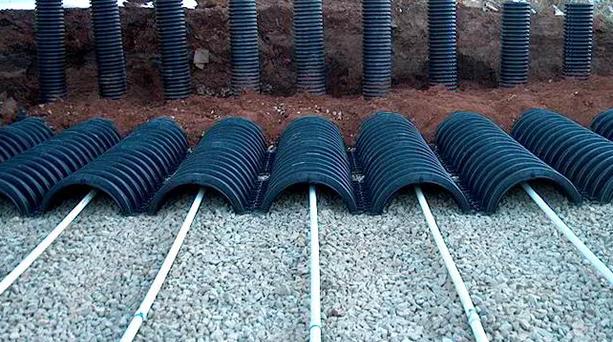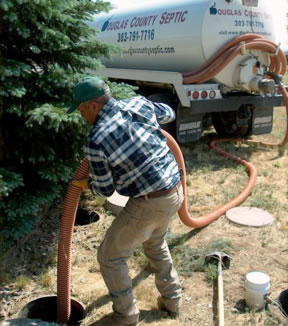
Taking Care of Your Septic System
 If you are new to rural life, you probably have never given much thought to one common aspect of living “in the country”. This would be your septic system. In town, your waste water leaves your house, goes to the central waste water treatment plant, where it is treated by trained specialists. This water then goes away and is never thought of again. When your home is connected to a septic system, your waste is your own responsibility. This responsibility can have environmental consequences far beyond the boundaries of your own property. The septic tank provides a place for waste water flow to slow down long enough for the solids can settle out. This “treated” water flows into the leach field, where it percolates through the soil which cleanses it. This is a simple system, but it only works if you take care of your system. With proper care and maintenance, a septic tank will require pumping every 2 – 4 years. Your county health department can provide you with a list of licensed septic pumpers. Neglect of a septic tank is the most common cause of damage to the leachfield. When the tank is not pumped routinely, sludge and scum build up to the point where they are carried into the leachfield and block the flow of liquid into the soil. When this occurs, the leachfield must be replaced, which is an expensive project. Proper use will ensure a healthy and stable bacterial population. Bacteria are vital to the breakdown of the solids. The best way to prevent septic failure is to observe the routine pumping schedule. Failing septic systems have the potential to risk human health through the exposure to raw sewage and the contamination of ground water supplies.
If you are new to rural life, you probably have never given much thought to one common aspect of living “in the country”. This would be your septic system. In town, your waste water leaves your house, goes to the central waste water treatment plant, where it is treated by trained specialists. This water then goes away and is never thought of again. When your home is connected to a septic system, your waste is your own responsibility. This responsibility can have environmental consequences far beyond the boundaries of your own property. The septic tank provides a place for waste water flow to slow down long enough for the solids can settle out. This “treated” water flows into the leach field, where it percolates through the soil which cleanses it. This is a simple system, but it only works if you take care of your system. With proper care and maintenance, a septic tank will require pumping every 2 – 4 years. Your county health department can provide you with a list of licensed septic pumpers. Neglect of a septic tank is the most common cause of damage to the leachfield. When the tank is not pumped routinely, sludge and scum build up to the point where they are carried into the leachfield and block the flow of liquid into the soil. When this occurs, the leachfield must be replaced, which is an expensive project. Proper use will ensure a healthy and stable bacterial population. Bacteria are vital to the breakdown of the solids. The best way to prevent septic failure is to observe the routine pumping schedule. Failing septic systems have the potential to risk human health through the exposure to raw sewage and the contamination of ground water supplies.
Septic Do’s and Don’ts:
Do: Pump your tank regularly. Alternate leachfields every spring if your system has dual leach fields.
Do: Limit the use of drain solvents, household chemicals, strong disinfectants and chlorine. Continual use of these substances can inhibit bacterial action, causing rapid buildup of solids in the tank.
Do: Keep a diagram showing the location of your septic tank and leachfield in relation to your house. Keep records on septic pumping or service on the premises regardless of current ownership.
Don’t: Dispose of sanitary napkins, tampons, diapers, paper towels, cooking oil, grease, solvents, paint, etc. in your septic system. Garbage disposals should be used sparingly in connection with a septic system. Coffee grounds, fats, and meats should never be run through your garbage disposal into a septic system.
Don’t: Park or drive vehicles over or allow large animals on any part of your septic system.
Don’t: Plant large shrubs or trees over or near the septic area because roots can cause damage to the pipes.
Don’t: Place splinkler systems close to the leachfield. All surface water runoff should be directed away from this area to prevent further saturation of the soil.
Maintenance Program for Engineered Systems
We offer a maintenance program to owners of engineered septic systems, consisting of the following maintenance items, performed twice a year, approximately 6 months apart:
- Perform field section rotation by switching valves or surge tank riser plugs.
- Inspect field for balanced distribution of effluent to all field sections.
- If necessary, reduce flow to wet or damp sections.
- Check proper setting of alarm float switch and operation of alarm system.
- Check proper setting of pump float switch and operation of pump.
- Check condition of electrical wiring junctions at tank.
- Check solids accumulation in tank(s) and tank condition
 The cost of this maintenance program is annual, payable in advance before inception of the service, and on the anniversary date thereafter. This fee covers the cost of setting up a separate file for your system, obtaining system design information from the engineer and the as-built drawing from the installer or health department, as well as keeping a record of the semiannual visits. We will furnish you a written report at the time of the visit, either by leaving at the house or by mail, fax or email, as you choose. The report will show the results of the inspection, what was performed and will list any items that may need repair, along with the estimated cost. Please contact us for a personalized maintenance plan for your septic system.
The cost of this maintenance program is annual, payable in advance before inception of the service, and on the anniversary date thereafter. This fee covers the cost of setting up a separate file for your system, obtaining system design information from the engineer and the as-built drawing from the installer or health department, as well as keeping a record of the semiannual visits. We will furnish you a written report at the time of the visit, either by leaving at the house or by mail, fax or email, as you choose. The report will show the results of the inspection, what was performed and will list any items that may need repair, along with the estimated cost. Please contact us for a personalized maintenance plan for your septic system.
Homeowner’s Association Maintenance Plans
Most homeowners are not educated on the use and care of their largest underground investment. The septic system is one of the most important and vital systems operating in a home. The importance of proper use and maintenance cannot be stressed enough. We work with many HOAs to provide scheduled maintenance and inspections for all septic systems and can provide reports of repairs needed and pumping needs for each system. Please contact us for more information or to schedule routine inspections for your Homeowner’s Association. We look forward to partnering with you!





